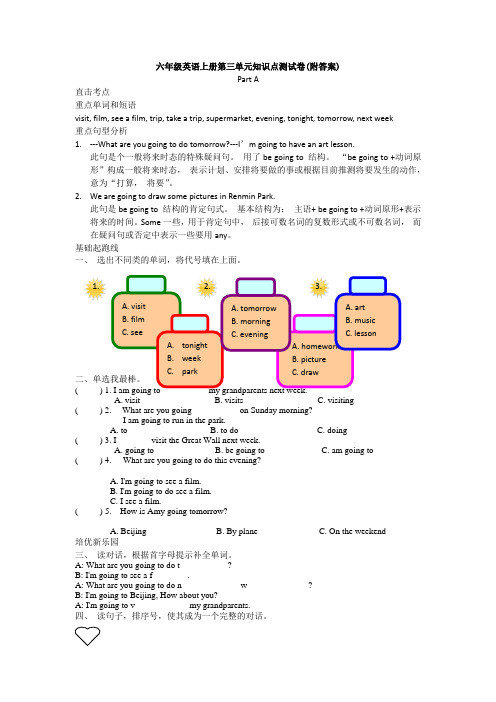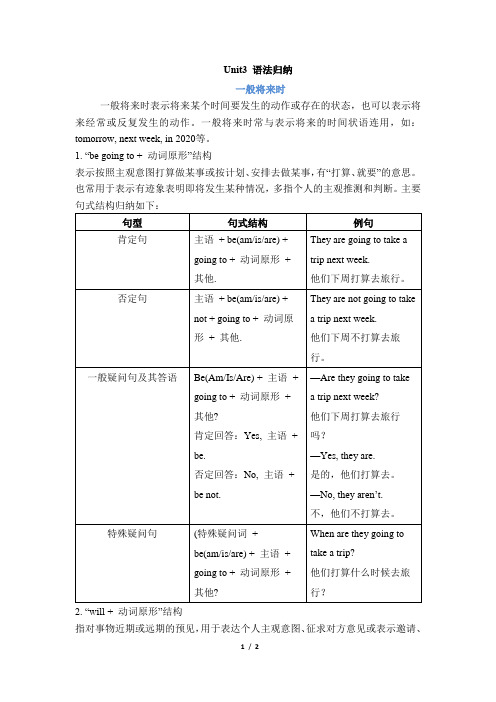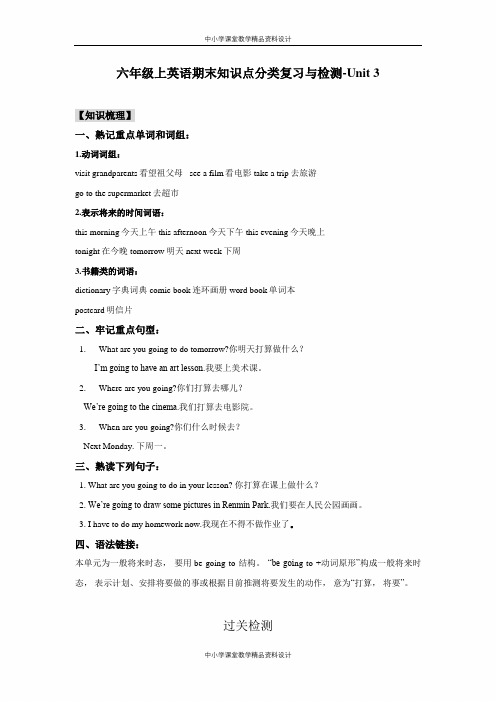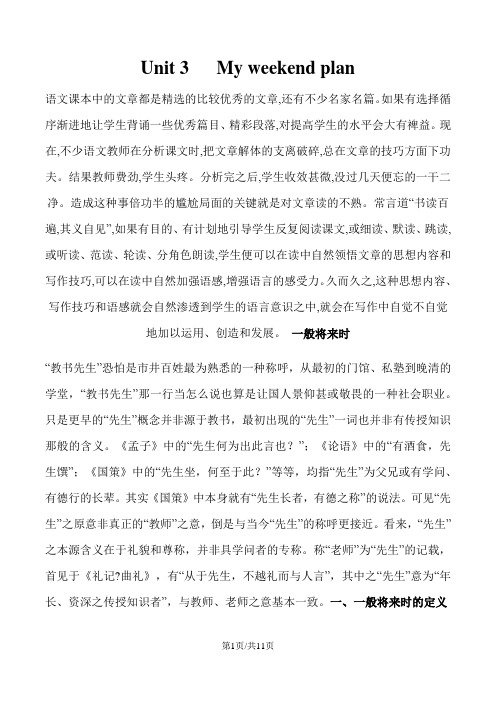六年级上册英语单元测试unit3 一般将来时时态复习_人教(PEP)
人教PEP版六年级英语上册Unit 3 单元整理与复习

一、按听到的先后顺序给下列句子排序。 () I’mgoingtohaveanartlesson.
2 () Whatareyougoingtodoinyourlesson? () S3oundgreat! I’mgoingtoseeafilmtomorrow. () W5 hatareyougoingtodotomorrow? () Youtoo. Ihavetodomyhomeworknow. Bye.
() 5A. A. porkB. forkC. wordD. north
C
二、单项选择。
() 1A.Whatareyougoingtodoafterschool? A. I’mgoingtobuyabook. B. I’mastudent. C. Igohome. () 2. I’mCgoingat4o’clock______theafternoon______Friday. A. in; inB. at; onC. in;on
16. Fisforfamily. F代表家庭。 17. We’llallbetogethertonight. 今晚我们都将聚在一起。 18. Weeatmooncakesandtellstoriesaboutthemoon. 我们吃月饼,讲关于月亮的故事。 19. Youcanbetogetherwithyourfamilytoo. 你也可以和你的家人聚在一起。
() 3B.—Areyougoingtobuy______books? —Yes. Iwanttobuy______storybooks. A. some, anyB. any, someC. some, some () 4. She’sgoingto_______theGreatWallnextweek. A.AvisitB. visitsC. visiting
【三套试卷】【人教PEP版】小学六年级英语上册第三单元教材检测卷附答案

六年级英语上册第三单元知识点测试卷(附答案)Part A直击考点重点单词和短语visit, film, see a film, trip, take a trip, supermarket, evening, tonight, tomorrow, next week 重点句型分析1. ---What are you going to do tomorrow?---I ’m going to have an art lesson.此句是个一般将来时态的特殊疑问句。
用了be going to 结构。
“be going to +动词原形”构成一般将来时态, 表示计划、安排将要做的事或根据目前推测将要发生的动作, 意为“打算, 将要”。
2. We are going to draw some pictures in Renmin Park.此句是be going to 结构的肯定句式。
基本结构为: 主语+ be going to +动词原形+表示将来的时间。
Some 一些,用于肯定句中, 后接可数名词的复数形式或不可数名词, 而在疑问句或否定中表示一些要用any 。
基础起跑线一、 选出不同类的单词,将代号填在上面。
1. 2. 3.4. 5.二、单选我最棒。
( ) 1. I am going to __________ my grandparents next week.A. visitB. visitsC. visiting ( ) 2. ---What are you going __________ on Sunday morning?---I am going to run in the park.A. toB. to doC. doing ( ) 3. I _______ visit the Great Wall next week.A. going toB. be going toC. am going to ( ) 4.----What are you going to do this evening?----_______________________ A. I'm going to see a film. B. I'm going to do see a film. C. I see a film.( ) 5.---How is Amy going tomorrow?---__________________A. BeijingB. By planeC. On the weekend 培优新乐园三、 读对话,根据首字母提示补全单词。
人教PEP六年级英语上册 Unit3_语法归纳

Unit3 语法归纳
一般将来时
一般将来时表示将来某个时间要发生的动作或存在的状态,也可以表示将来经常或反复发生的动作。
一般将来时常与表示将来的时间状语连用,如:tomorrow, next week, in 2020等。
1. “be going to + 动词原形”结构
表示按照主观意图打算做某事或按计划、安排去做某事,有“打算、就要”的意思。
也常用于表示有迹象表明即将发生某种情况,多指个人的主观推测和判断。
主要
2. “will + 动词原形”结构
指对事物近期或远期的预见,用于表达个人主观意图、征求对方意见或表示邀请、。
2015—2016学年度pep六年级英语上册U3—4知识点归纳及习题

Unit3- 4知识点梳理Unit3一般将来时一般将来时,将要发生事。
谓语不一般,be going to 加动原,说完活动后面再把时间状语添。
1.主语+ going to do(+将来时间)?主语人称代词+be going to +动词原形.例句:What are you going to do tomorrow? I’m going to have an art lesson.2.主语+ going ? To +地点/主语人称代词+ be going to +地点.例句:Where is your mother going ? She is going to the supermarket.3.主语+ going ? 将来时间/主语人称代词+ be going+ 将来时间例句:When are Sarah and Sam going? Tomorrow /They are going tomorrow.Unit4动词原形变动词 ing 形式的规则● 1.singing cooking动词后直接加ing● 2.dance- dancing make- making give-giving以不发音的e结尾,去e在加ing● 3.sit-sitting swim-swimming run-running以一个辅音字母结尾的重读闭音节,双写最后一个辅音字母再加ing变● 1.一般后直接加-sdesk---desks● 2.部分以o 结尾的动词后加-es tomato—tomatoespotato--potatoes部分以o 结尾的动词后加-s photo—photos● 3.以-ch,-sh,-x,-s结尾的动词后加—eswatch—watches dish--dishes box—boxes bus--buses4.以辅音+y结尾后,改y 为i,再加-es strawberry---strawberries变● 1.一般后直接加-ssing-sings dance-dances● 2.以o 结尾的动词后加-esgo-goes do –does● 3.以-ch,-sh,-x,-s结尾的动词后加—eswatch—watches wash—washes, fix—fixes,miss-misses( ) 7.When _____their teacher going? A.is B.are C.am( )8.When_____his friends going? A.is B.are C.am( )9.They_____ going to go _____a picnic. A. are,on B. is,inC.are,for( )10.What are you going to do _____?A.in the morningB.this eveningC.this the afternoon( )11.He is going to the cinema.He is going to _____A.take a tripB.see a filmC.go to the supermarket( ) 12. _____ is Sarah going _____?TomorrowA.What,to doB.When , /C.Where, /( )13.What ______going to do ? A. I am B.is they C.am,I( )14.They going to look _____ some beautiful leaves. A. for B.to C.in( )15.Can Mike _____ swimming today? A.going B.went C.go( )16.I am going to the cinema _______ this afternoon. A.on B.in C./。
人教版六年级英语上册知识点归纳 Unit3一般将来时的表达方法

一般将来时的五种表达方法一般将来时1)am/is/are/going to + do和will/shall + doshall用于第三人称单数,常被will 所代替,二者都可以缩写成'll。
will 在陈述句中用于各人称,在征求意见时常用于第二人称。
Which paragraph shall I read first.Will you be at home at seven this evening?2) be going to +动词原形或地点,表示将来。
a. 主语的意图,即将做某事。
What are you going to do tomorrow?b. 计划,安排要发生的事。
The play is going to be produced next month。
c. 有迹象要发生的事。
Look at the dark clouds, there is going to be a storm.3) be +不定式表将来,按计划或正式安排将发生的事。
We are to discuss the report next Saturday.4) be about to +不定式,意为马上做某事。
He is about to leave for Beijing.注意:be about to 不能与tomorrow, next week 等表示明确将来时的时间状语连用。
一般将来时1.一般将来时的基本概念一般将来时表示将来某一时刻的动作或状态,或将来某一段时间内经常的动作或状态。
一般将来时由助动词shall(第一人称),will(第二、三人称)+动词原形构成。
美国英语则不管什么人称,一律用will。
2.一般将来时的形式●will 常简略为'll,并与主语连写在一起,如:I'll,he'll,it'll,we'll,you'll,they'll。
六年级新人教PEP英语 六年级上册英语期末知识点分类复习与检测-Unit3(含答案及听力材料)

六年级上英语期末知识点分类复习与检测-Unit 3【知识梳理】一、熟记重点单词和词组:1.动词词组:visit grandparents看望祖父母 see a film看电影 take a trip去旅游go to the supermarket去超市2.表示将来的时间词语:this morning今天上午 this afternoon今天下午 this evening今天晚上tonight在今晚tomorrow明天next week下周3.书籍类的词语:dictionary字典词典comic book连环画册word book单词本postcard明信片二、牢记重点句型:1. ---What are you going to do tomorrow?你明天打算做什么?---I’m going to have an art lesson.我要上美术课。
2. ---Where are you going?你们打算去哪儿?---We’re going to the cinema.我们打算去电影院。
3. ---When are you going?你们什么时候去?---Next Monday. 下周一。
三、熟读下列句子:1. What are you going to do in your lesson? 你打算在课上做什么?2. We’re going to draw some pictures in Renmin Park.我们要在人民公园画画。
3. I have to do my homework now.我现在不得不做作业了。
四、语法链接:本单元为一般将来时态,要用be going to 结构。
“be goi ng to +动词原形”构成一般将来时态,表示计划、安排将要做的事或根据目前推测将要发生的动作,意为“打算,将要”。
过关检测Listening Part(共35分)一、听录音,圈出你所听到的单词。
小学英语人教版(PEP)六年级上册专项复习 一:一般将来时

游戏规则: 按要求每完成一项任务即可 获得相应的分数,满10分即可获得一个荣耀等 级,最高等级为最强王者。
一、概念: 一般将来时表示将要发生的动作或存在的状态及 打算、计划或准备做某事。句中一般有以下时间 状语:tomorrow, next day(week, month, year…), soon, the day after tomorrow(后天)等。
→ __W__il_l_y_o_u_r_f_a_t_h_e_r_g_o_h__ik_i_n_g_n__ex_t__S_u_n_d_a_y_?_____ ____Y_e_s_,_h_e_w__il_l_. _/ _N_o_,_h_e__w_o_n_'_t.______________
3. 对划线部分提问:(2.5分) 一般情况,一般将来时的对划线部分有五种情况。 ① 问人:Who I’m going to New York soon. → _W__h_o_’_s_g_o_i_n_g_t_o__N_e_w__Y_o_r_k_s_o_o_n_?_____________ ② 问干什么:What … do. My father is going to watch TV with me this afternoon. → W__h_a_t__is_y_o_u_r__fa_t_h_e_r_g_o_i_n_g_t_o_d_o__w_i_th__y_o_u_t_h_is__a_ft_e_r_n_o_o_n_?
考考你:变为一般疑问句并做回答 (2分) We are going to go on a picnic this weekend.
→ __A_r_e__y_o_u_g_o_i_n_g_t_o_g_o__o_n__a_p_i_c_n_ic__th__is_w__e_e_k_e_n_d_? ____Y__es_,_I_a_m__._/_N__o_, _I'_m__n_o_t_.________________ My father will go hiking next Sunday.
六年级上册英语单元测试unit3 一般将来时时态复习_人教(PEP)()

Unit 3 My weekend plan语文课本中的文章都是精选的比较优秀的文章,还有不少名家名篇。
如果有选择循序渐进地让学生背诵一些优秀篇目、精彩段落,对提高学生的水平会大有裨益。
现在,不少语文教师在分析课文时,把文章解体的支离破碎,总在文章的技巧方面下功夫。
结果教师费劲,学生头疼。
分析完之后,学生收效甚微,没过几天便忘的一干二净。
造成这种事倍功半的尴尬局面的关键就是对文章读的不熟。
常言道“书读百遍,其义自见”,如果有目的、有计划地引导学生反复阅读课文,或细读、默读、跳读,或听读、范读、轮读、分角色朗读,学生便可以在读中自然领悟文章的思想内容和写作技巧,可以在读中自然加强语感,增强语言的感受力。
久而久之,这种思想内容、写作技巧和语感就会自然渗透到学生的语言意识之中,就会在写作中自觉不自觉地加以运用、创造和发展。
一般将来时“教书先生”恐怕是市井百姓最为熟悉的一种称呼,从最初的门馆、私塾到晚清的学堂,“教书先生”那一行当怎么说也算是让国人景仰甚或敬畏的一种社会职业。
只是更早的“先生”概念并非源于教书,最初出现的“先生”一词也并非有传授知识那般的含义。
《孟子》中的“先生何为出此言也?”;《论语》中的“有酒食,先生馔”;《国策》中的“先生坐,何至于此?”等等,均指“先生”为父兄或有学问、有德行的长辈。
其实《国策》中本身就有“先生长者,有德之称”的说法。
可见“先生”之原意非真正的“教师”之意,倒是与当今“先生”的称呼更接近。
看来,“先生”之本源含义在于礼貌和尊称,并非具学问者的专称。
称“老师”为“先生”的记载,首见于《礼记?曲礼》,有“从于先生,不越礼而与人言”,其中之“先生”意为“年长、资深之传授知识者”,与教师、老师之意基本一致。
一、一般将来时的定义死记硬背是一种传统的教学方式,在我国有悠久的历史。
但随着素质教育的开展,死记硬背被作为一种僵化的、阻碍学生能力发展的教学方式,渐渐为人们所摒弃;而另一方面,老师们又为提高学生的语文素养煞费苦心。
- 1、下载文档前请自行甄别文档内容的完整性,平台不提供额外的编辑、内容补充、找答案等附加服务。
- 2、"仅部分预览"的文档,不可在线预览部分如存在完整性等问题,可反馈申请退款(可完整预览的文档不适用该条件!)。
- 3、如文档侵犯您的权益,请联系客服反馈,我们会尽快为您处理(人工客服工作时间:9:00-18:30)。
Unit 3 My weekend plan一般将来时一、一般将来时的定义1. 表示在将来某一时间将要发生的动作或存在的状态。
2. 表示计划、打算或准备的事情。
They are going to the cinema. 他们打算去电影院。
Lily is going to listen to the music. Lily 打算听音乐。
What are you going to do? 你准备干什么?二、一般将来时的结构1. 主语+ be going to + 动词原型+其它主语+ will + 动词原型+其它be going to 可以与will进行替换。
Jim is going to play football this afternoon. → Jim will play football this afternoon.My father will do the housework tomorrow.2. be not going to / will not +动词原形,如:Jim is not going to play football.注意:will not = won’t3. 一般疑问句:把be / will调到句首(主语是第一人称I 时,变一般疑问句时将I 变you),如:Is Jim going to play football this afternoon? / Will Jim play football this afternoon?I am going to visit Australia. → Are you going to visit Australia? Yes, I am / No, I am not.4. 特殊疑问句:疑问词+be+主语+going to+动词原形?/ 疑问词+will+主语+动词原形,如:What is Jim going to do this afternoon? / What will Jim do this afternoon?注意:⑴疑问词当主语时:疑问词+ be going to / will + 动词原形?如:Who is going to play football this afternoon? / Who will play football this afternoon?⑵—Where are you going? —We’ re going to Beijing. / —Where will you go? —We will goto Beijing.问句中不要用到to。
三、对划线部分提问。
一般情况,一般将来时的对划线部分有三种情况。
1. 问人WhoI’m going to go to New York soon. →Who is going to go to New York soon?2. 问干什么What ,do.My father is going to watch a match with me this afternoon.→What is your father going to do with you this afternoon?3. 问什么时候When.She is going to go to bed at nine. →When is she going to go to bed?四、与一般将来时连用的时间状语this afternoon / evening, tonight 今天…… tomorrow (morning / afternoon / evening )明天……next week / Sunday / month / year下周/…… the day after tomorrow 后天in three days 三天后in the future 将来一般将来时专项练习一、根据中文,完成句子,每空一词。
1. 我打算明天和朋友去野炊。
I _________ __________ __________ have a picnic with my friends. 或者:I ___________ have a picnic with my friends.2. 下个星期一你打算去干嘛? 我想去打篮球。
— What _________ ________ ___________ __________ __________next Monday? — I ________ ___________ ________ play basketball. 或者:— What ___________ you do next Monday?— I ___________ play basketball.3. 你妈妈这个周末去购物吗?是,她要去买一些水果。
— _________ your mother __________ __________ go shopping this __________ ? —Yes, she _________. She_________ buy some fruit.4. 你们打算什么时候见面?What time __________ you _________ _________ meet?二、选择答案。
( ) 1. I am going ____ my grandmother and grandfather.A. visitB. to visitC. visiting( ) 2.What ____ you want to be?A. areB. doesC. do( ) 3. --- ________________----I’m going to the science museum.A. What are you going to do this afternoon?B. What are you doing?( )4. ----________________ ------On foot.A.Do you go to school by bike everyday?B.How do you go to school every day, Helen?( )5.-----__________.----- I usually read books.A. What are you doing?B. What do you do in the evening?三、选择填空。
when what where how what time which who-___________ are you going?- I am going to the Great Wall.-___________are they going to school? -They’re going to go to school by bus.-___________ are you going to the museum? –Tomorrow afternoon.-___________ are you going to buy? –We are going to buy some fruit.-___________ is she going with? –She is going to Beijing with her mum.四、连词成句。
1. you, are, do, to, this, evening, going, what_______________________________________________________________________________ 2. my, clean, going, room, am, to ,I_______________________________________________________________________________ 3. by, am, I going, train________________________________________________________________________________ 4. visit, are, going, we, aunt, my, to________________________________________________________________________________ 5. this, theme, park, I’m, to, going, afternoon ,the________________________________________________________________________________五、改句子。
1、Nancy is going to go camping.(改否定)Nancy __________ going to go camping.2、I am going to go and join them.(改否定)I _____________________ go ______ join them.3、I'm going to get up at 6:30 tomorrow.(改一般疑问句)________ _______ ________ to get up at 6:30 tomorrow?4、We will meet at the bus stop at 10:30、(改一般疑问句)___________ __________ meet at the bus stop at 10:30?5、She is going to listen to music after school、(对划线部分提问)________ _______ she ________ ________ _________ after school?6、My father is going to see a play the day after tomorrow.(对划线部分提问)_________ _________ going to see a play the day after tomorrow?综合练习一、单项选择1.What are you_________tonight?A.go to doB. going doC.going to do2..We’re going to have an _________ lesson.A.artB.ChineseC.music3.I can ___________in summer.A.go swimmingB.going swimmingC.swimming4.当朋友提出不错的建议,你会赞同地说:A.You’re welcome.B.Sounds great!C.Not at all.5.朋友们要去旅游,送行时你会说:A.Have a good time!B.The time is good.C.What time is it?6.你和你的朋友要去不同的地方度假,你预祝他玩得开心,他也会回答说:A.Me too.B.We too.C.You too.7.My ________are going to the supermarket.A.friendB.brotherC.family8.We are going to have a __________dinnerA.bigB.longC.tall9.Tomorrow is Mid-Autumn Festival.We are going to________mooncakes.A.doB.drinkC.make10.My mother always tells_______stories.A.weC.I11.My family are going to ________together.A.goB.getC.goes12.I’m going to __________a film with Mike.A.seeB.watchC.read.13.There are _________trees in the park.A.lot ofB. a lotC.lots of14.What are you going to do_________?A.thereB.theirC.Where15.Can________help__________?A.you ;IB.I; youC.you; my二、读一读,按时间的顺序,用数字给下列单词或短语排排队。
